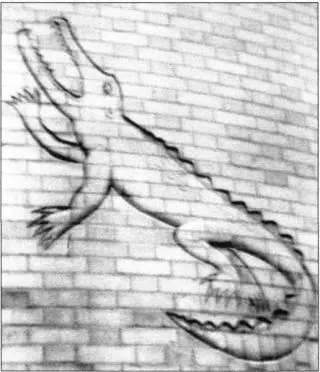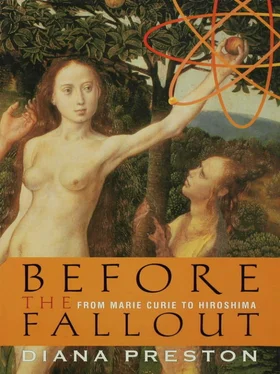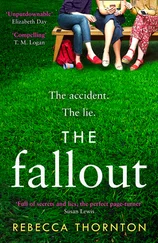For the present, nuclear science remained an open subject studied for the joy of knowledge.
• • •
Rutherford took the Nazi threat to science extremely seriously. He agreed to head up the Academic Assistance Council, created in May 1933 in London to find academic jobs in Britain for the Jewish scientific refugees. It was a formidable task. More than fifteen hundred had been thrown out of work, including at least a quarter of Germany’s physicists. Rutherford chaired a huge gathering in the Albert Hall, at which one of the chief speakers was Einstein, unmistakable according to one of those present, with his shaggy mane of hair, “great furrowed forehead,” and “enormous bulging chocolate-brown eyes.”
Rutherford helped many personally, including Max Born and his Quaker wife, doing everything from finding the Borns somewhere to live in Cambridge and driving them to visit their quarantined dog to providing Born with temporary work at Cambridge until the offer of the physics chair at Edinburgh University came through. So successful were Rutherford’s efforts at practical as well as moral support that Born later wrote: “A disaster turned out to be a blessing. For there is nothing more wholesome and refreshing for a man than to be uprooted and replanted in completely different surroundings.” Although he supported his right to receive help, Rutherford did not wish to meet Fritz Haber, who in the year prior to his death was living in England. Born recorded how Rutherford “declined violently” an invitation to his house because Haber was to be present; “he did not wish to have any contact with the man who had invented chemical warfare with the help of poison-gas.”
Niels Bohr, half-Jewish himself, was also very active on behalf of Germany’s displaced scientists, firing off unsolicited invitations to people to come to Copenhagen. The international conference he held there every summer became, in the words of one refugee, “a sort of labour exchange.” James Franck found sanctuary in Copenhagen before going to America. So did Edward Teller before going first to England and then on to the United States. Teller was unstinting in his praise of the Academic Assistance Council and of the British, saying, “They accepted many more scientists than Britain could possibly use and all of us were welcomed as permanent residents…. the English are truly among the most hospitable and ethical people in the world.”
Bohr also helped Lise Meitner’s young nephew, Otto Frisch, who had been dismissed from Hamburg University. In October 1933 Frisch had arrived in England to work under Patrick Blackett, the left-leaning head of the physics department in Birkbeck College, London. Learning of the Joliot-Curies’ discoveries, Frisch built himself some apparatus from a few bits and pieces from Woolworth’s and began investigating artificial radioactivity for himself. When Bohr came to London to visit Blackett later that year, he offered the ingenious but unknown young man the chance to come to Copenhagen. Frisch wrote to his mother that it was as if “God Almighty himself has taken me by my waistcoat button and spoken kindly to me.”
In the United States Hungarian Eugene Wigner, who had emigrated there before Hitler came to power, joined forces with another émigré colleague and wrote in German to a small group of physicists at American educational establishments. They asked them to set aside a small percentage of their income for the next two years to help former colleagues find academic posts in America. Oppenheimer, who had relatives in Germany and, in his words, felt “a continuing, smoldering fury about the treatment of Jews in Germany,” was one of the recipients. However, the originators of the scheme were wary of launching a general appeal not only because academic jobs in the United States were in short supply but also because some universities were known to be reluctant to employ Jews.
In Russia, despite Stalin’s desire to push his country to the forefront of science, the Soviet authorities made few attempts to attract the talented, jobless people so anxiously seeking new positions. Growing paranoia about infiltration by foreign agents meant that only those with known communist sympathies were admitted. Until 1937 they were allowed to work in Russia’s physics institutes, but many then fell victim to Stalin’s purges. Suspected of being spies, they were imprisoned, tortured and exiled.
Just as in Germany, Russia’s scientists were becoming progressively caught in an ideological web. Abram Joffe felt he was “living on top of a volcano.” After the defection of a leading theoretical physicist, George Gamow, at the 1933 Solvay Conference, Joffe was no longer permitted to travel outside Russia. Soviet scientists working abroad also felt vulnerable. Lev Landau, studying in Berlin, implored colleagues never to discuss politics with him in case it got him into trouble. Peter Kapitza, however, felt perfectly at ease. He was about to take charge of the splendid new Mond Laboratory for magnetic field and low-temperature research in Cambridge. The building was a model of art-deco chic, with a crocodile etched on the facade in affectionate tribute to Rutherford.
However, in 1934, Kapitza made an ill-advised visit to Russia. Just as he was preparing to return to Cambridge, he was informed that the Soviet Union “could no longer dispense with his services, in view of the danger from Hitler.” His second wife, Anna, whom he had married in 1927, was allowed to return with the news to England, from where she sent her frustrated husband parcels of everything from toilet paper to trousers, both of which he discovered were, unlike oysters and smoked sturgeon, virtually unobtainable in Russia.
Rutherford was shocked and angry. He tried everything he could to pressure the Soviet government, but to no avail. In the end, all he could do was to offer to ship Kapitza the brand-new equipment installed for him in the Mond Laboratory, which reached Leningrad jumbled up in a cargo of frozen meat. After much argument, the Russian government paid thirty thousand pounds for the apparatus and installed it in a lavish new institute, built expressly for Kapitza. By 1936 the trapped Russian, for whom there would be no more dinners at high table in Cambridge or thoughts of a peerage, reflected philosophically to Rutherford that “we are only small particles of floating matter in a stream which we call fate…. the stream governs us….” Rutherford wrote bracingly but sympathetically, “A reasonable number of fleas is good for a dog—but I expect you feel you have more than the average number.”

Peter Kapitza’s crocodile on the Mond Laboratory at Cambridge
Anna Kapitza, who rejoined her husband in Moscow in 1936, believed that Rutherford’s staunch support had kept her highly strung husband from suicide, confiding, “I am absolutely certain I owe to you the life of Kapitza, without his love and gratitude to you, without your invaluable help… he would not be alive.” [20] According to one story, when Kapitza finally returned to Cambridge thirty years later, in the 1960s, he was invited to dine at Trinity College. To his consternation he realized he had no academic gown to wear. The college butler came to the rescue, producing Kapitza’s original gown, unworn since 1934.
Kapitza would survive the savage purges that would reach their peak in 1937–38 when nearly 8 million were arrested, including one hundred physicists (many of whom were shot or vanished into the gulags). Abram Joffe would also be spared to sustain Soviet physics through these precarious times. However, fear of the nighttime knock on the door sapped the creativity of Russian scientists at a critical time for nuclear physics.
Читать дальше













